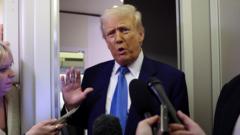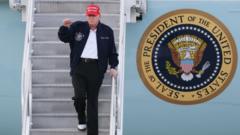Pierre Poilievre, the Conservative Party leader in Canada, stands at a crossroads as his ties to American conservatism intensify amidst Donald Trump's bold declarations regarding Canada.
Trump's Influence on Canadian Politics: The Challenge for Pierre Poilievre

Trump's Influence on Canadian Politics: The Challenge for Pierre Poilievre
As conservative leader Pierre Poilievre grapples with Trump's Canadian ambitions, his strategies may burden his support among mainstream voters.
In Montreal, political dynamics shift as Pierre Poilievre, the leading candidate to helm Canada's conservative movement, finds himself caught in a complex web of American political influence. Endorsed by prominent Trump supporters, Poilievre has become an emblem of a brand of unapologetic conservatism celebrated by the American right. His platform is grounded in a promise to overhaul what he deems a "broken" nation, utilizing a “common sense” approach against elite establishments and the progressive agenda.
While Poilievre’s alignment with figures like Trump and Elon Musk presents an opportunity to draw in hardcore conservative supporters, it simultaneously isolates him from centrist and mainstream Canadian voters. Musk's recent endorsement of Poilievre and his rhetoric on federal bureaucracy could bolster his image within the right-wing faction, however, the prospect of Trump's ongoing influence—marked by alarming threats of annexation—poses a significant dilemma for Poilievre on the national stage.
During a recent press conference, Poilievre sidestepped questions regarding Musk's endorsement, illustrating his attempt to navigate the delicate balance of foreign political allegiances while maintaining a distinct Canadian identity. His casual dismissal of Musk’s backing by equating it with a child’s fanciful desire to visit Mars reflects an awareness of the tricky waters he must tread, wanting to engage without fully embracing sentiments that might alienate broader voter bases.
While hardcore conservatives in Canada may cheer for the U.S. connections, Poilievre faces a crucial test: can he balance the appeal of American conservatives while also reassuring Canadian voters wary of foreign overreach? The challenge will be defining the movement in a way that resonates within Canada’s diverse political landscape—risking either a consolidation of power within a niche or creating a broader coalition that can withstand the complexity of contemporary Canadian politics.
In a political environment rife with polarization, Poilievre’s response to Trump’s threats and endorsements will be instrumental in determining his viability as a leader capable of addressing the real concerns of all Canadians. His strategic navigation becomes crucial as the electorate awaits to see if he can emerge as a consensus leader rather than just a vessel for American-style conservatism.
While Poilievre’s alignment with figures like Trump and Elon Musk presents an opportunity to draw in hardcore conservative supporters, it simultaneously isolates him from centrist and mainstream Canadian voters. Musk's recent endorsement of Poilievre and his rhetoric on federal bureaucracy could bolster his image within the right-wing faction, however, the prospect of Trump's ongoing influence—marked by alarming threats of annexation—poses a significant dilemma for Poilievre on the national stage.
During a recent press conference, Poilievre sidestepped questions regarding Musk's endorsement, illustrating his attempt to navigate the delicate balance of foreign political allegiances while maintaining a distinct Canadian identity. His casual dismissal of Musk’s backing by equating it with a child’s fanciful desire to visit Mars reflects an awareness of the tricky waters he must tread, wanting to engage without fully embracing sentiments that might alienate broader voter bases.
While hardcore conservatives in Canada may cheer for the U.S. connections, Poilievre faces a crucial test: can he balance the appeal of American conservatives while also reassuring Canadian voters wary of foreign overreach? The challenge will be defining the movement in a way that resonates within Canada’s diverse political landscape—risking either a consolidation of power within a niche or creating a broader coalition that can withstand the complexity of contemporary Canadian politics.
In a political environment rife with polarization, Poilievre’s response to Trump’s threats and endorsements will be instrumental in determining his viability as a leader capable of addressing the real concerns of all Canadians. His strategic navigation becomes crucial as the electorate awaits to see if he can emerge as a consensus leader rather than just a vessel for American-style conservatism.























